Make maths come to life for your little learner!


Published: July 2024


Make maths come to life for your little learner!

Author
Christina Levandowski

Expert Reviewer
Jill Padfield
Published: July 2024




Make maths come to life for your little learner!

Author
Christina Levandowski

Expert Reviewer
Jill Padfield
Published: July 2024


Key takeaways
The best maths games are fun maths games — and that’s a fact. Children learn best when they have the ability to fail freely and figure it out themselves, fostering their love of learning and solidifying key skills they’ll need later in life.
Let’s get into some of the best classic game options and maths activities out there for your young learner.
Board games can be used both in and out of class, giving your students a hands-on learning experience they’ll love. Board games work well with small groups and can apply to children of all year groups, from EYFS to secondary school.
Card games are great to learn maths on the go and are so much fun to solidify concepts—such as estimation, fractions, and formulas.
Interactive games are a fun first person way to learn your favorite concepts and are some of the best ways to introduce maths topics to your little learner.
Hailing from the days of searching “cool maths games,” many parents and teachers consider online games to be one of the best ways to master maths concepts. Armed with unique features such as multiplayer mode, these games offer an extra layer of relevancy to students when it’s maths time.
Older students with smart phones or parents of young children might really appreciate the ease that maths apps can bring to the school day. They often come jam-packed with lots of fun game options, an airtight privacy policy, and in-app purchases, keeping your learner safe and engaged throughout the session.
Unlock unlimited maths questions
Put your skills to the test with fun exercises + maths games that are proven to boost ability!
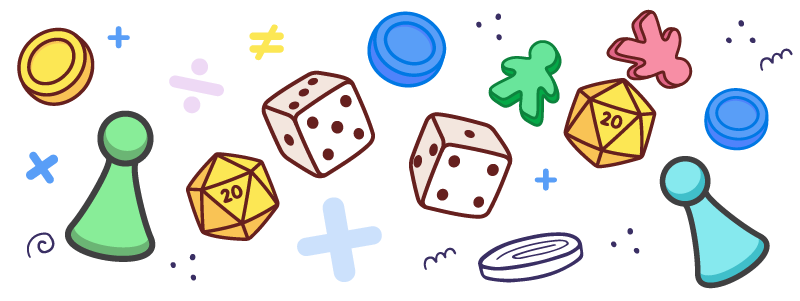
Short for addition, subtraction, multiplication, and division, Adsumudi is a fast-paced game that solidifies critical maths concepts without the typical “dense” textbook format. It’s recommended for ages 9+ and offers competitive, collaborative, or individual play options.
Winner of the Mensa Select Award and in over 4 million global homes, this maths game focuses on problem solving, logic, strategy, and critical thinking — otherwise known as the “invisible” skills of maths. It’s designed for 2-4 players and is great for children 6+. Don’t be fooled by the starting age, though. Many adults have great fun with this maths game, too! Check out Quirkle for yourself.
Proof is one of the rare maths board games that can be scaled to most age groups. Players will speed-create equations that cover core concepts, such as multiplication, division, square roots, and more.
Your student will shout the result and beat everyone to it, encouraging fast mental problem solving, logical thinking, and other essential skills. It’s recommended for players ages 9-109, according to the creators themselves.
Sequence and pattern puzzles are brain teasers that help children learn basic maths skills. The idea is for children to understand the pattern of shapes or numbers that have been provided, to find the next one in the sequence.
Try DoodleMaths for free!
Select a year group
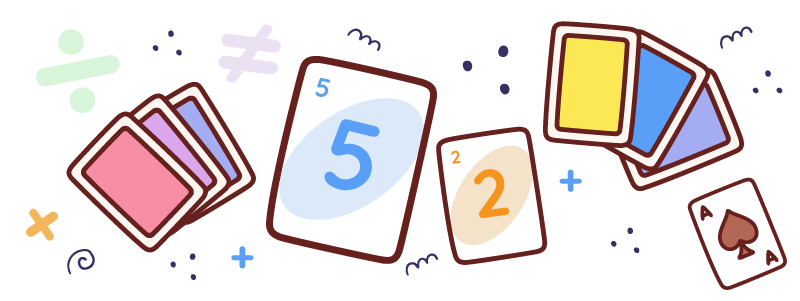
Rated for students in Year 4 and higher, this card game makes learning multiplication tables a fast and easy task. Multiplication Splat! will help kids learn 1×1 to 12×12 in a fun and engaging way, racing against the clock (and their fellow classmates).
Your student will learn how to build, solve, and reverse-engineer equations with this game! The set comes with 130 cards for hours of maths practice and review, prompting your student to master core concepts around addition and subtraction.
You’ll be able to make fraction freak-outs a thing of the past with this fun game. The concept is simple: Two players draw from their respective deck. Whoever has the largest fraction, wins! Keep battling it out, and subconsciously learn the value that each fraction can bring to an equation. The game is designed for players 8+ and is suitable for hours of maths learning fun.
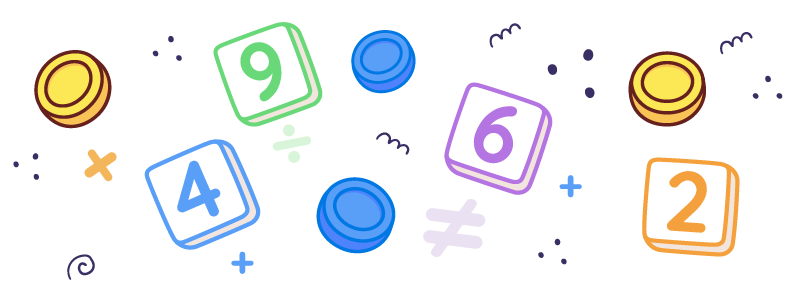
This fun maths game marries the concepts of colors and maths, creating an interactive game that empowers students to explore foundational maths skills — such as factorization, division, multiplication and prime numbers (all through color combinations and stacking!).
This book isn’t just a book. It’s actually 27 different hands-on, kinesthetic maths activities for your young learner aged 9-12.
The book offers creative crafts related to foundational and advanced maths concepts, such as geometry, abstract maths, measurement, trigonometry, and algebra fundamentals for the future. The best part? There are no expensive materials or equipment needed to do any of the activities.
This game is sure to please if you’ve got a thrill-seeker of a student on your hands! Mathological Liar is the deduction-based logic game that teaches core maths concepts. Students can collaborate and solve 200+ cases using their maths skills, tracking the alibis and selecting the likely perpetrator. This game is hands-on, entertaining, and modeled after the mystery dinners of old.
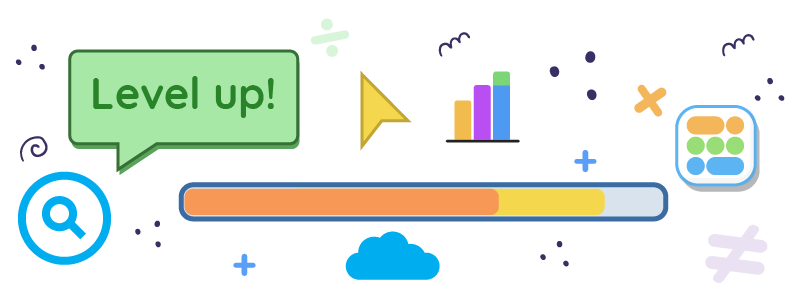
PBS Kids offers a range of age-appropriate maths games that feature your child’s favorite friendly characters. From practical shopping and pricing skills at Mega Mall to the Great Poddle weigh-in (circa Cyberchase), these games are sure to engage for several sessions of play.
RoomRecess has the greatest variety of maths skills taught, ranging from fractions and rounding to computation and geometry. Through the site, parents and kids will have access to a stream of games, worksheets, lessons, and more — bringing concepts to life right before their very eyes.
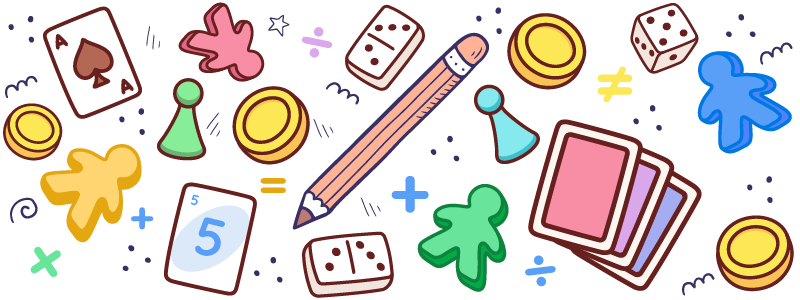
The DoodleMaths app is an award-winning tool that helps kids become fluent in critical maths concepts along the national curriculum. Parents can enjoy tailored practice that reflects the child’s specific learning level and style, accessing games through smartphones, tablets, and laptops in the home.
DoodleMaths is an award-winning app that’s filled with thousands of questions and games exploring multiplication, division and more!
Designed by teachers, it creates each child a unique work programme tailored to their needs, doubling their progression with just 10 minutes of use a day. Try it for free!


Maths concepts aren’t easy — students must build clear logic and deduction skills as a foundation for maths success. Presenting maths concepts through fun and engaging activities is a great way to help your kid get the correct answer on their next test, while making math enjoyable enough to fuel their ongoing love of learning.
Parents find that teaching maths through games also helps with the retention of concepts, taking the stress out of the learning and studying process.
Here are a few more reasons why you should “game on” from the comfort of your home.
Building confidence is key for maths success — especially for younger students who have had less time with practicing the concepts. Older kids can also benefit from an extra confidence boost as the content gets more difficult, dissuading them from getting “frozen” or avoiding certain concepts later on.
Making maths relatable can be a powerful concept for students of all ages. Rather than seeing maths as a far-off, school-exclusive concept, you can bring it to life right before their very eyes.
Maths has many “real world” applications. Rather than using the same-old sheet of maths problems or flash cards, younger students and older children alike can practice practical skills in one of the most intuitive forms possible — gaming.
Many games offer grade-level appropriate interactions with fellow players, either through a leaderboard setup or other methods. This can foster a healthy sense of competition and social appreciation in your child, both in and out of the school setting.
We know there are near-endless options to choose from when it comes to quality maths games for your children. Here’s how you can pick the best one for your family’s needs.
No two learners have the same preferences and style. Feel free to experiment with any of the free or paid tools on this list to understand how your child likes to learn. Keep in mind that this style might change and transform as your child grows older — which means you might want to look for tools that are diverse and adaptable over a range of grades.
Foundational concepts have to be mastered before your learner moves on to more complex maths. As you search, don’t just gauge by the age on the box. Consider looking at what’s covered and determine if it aligns well with your child’s level of understanding.
While maths games are created with your child’s educational journey in mind, not all of them are entirely correct. Be sure to dig into the game’s reviews and look for hallmarks of credibility in their marketing — such as mentions of curriculum congruency or relevant awards.
We understand that diving into new information can sometimes be overwhelming, and questions often arise. That’s why we’ve meticulously crafted these FAQs, based on real questions from students and parents. We’ve got you covered!
Games that focus on logic, strategy, maths concepts, and critical thinking help someone to improve their overall maths skills.
Children enjoy playing games and engage with them more consistently than other learning methods. This makes games a reliable source of learning for many students.
Mental maths can be especially helpful during exams or timed assessments when a calculator may not be allowed. Furthermore, students who excel in mental math often find it easier to grasp advanced mathematical concepts, and perform better in higher-level maths courses.
Asking a trusted teacher or mentor for help and consistent practise can help someone to improve their maths skills quickly.
DoodleMaths is one of the most comprehensive and accessible apps for maths games on the market. Parents can get customised reports, personalised learning pathways, and a 7-day free trial when they sign up today.


Parents, sign up for a DoodleMaths subscription and see your child become a maths wizard!

Lesson credits

Christina Levandowski
Christina has written for hundreds of clients from small businesses to Indeed.com. She has extensive experience working with marketing strategy and social media marketing, and has her own business creating assets for clients in the space. She enjoys being an entrepreneur and has also started pursuing investment opportunities as time permits.

Jill Padfield
Jill Padfield has 7 years of experience teaching mathematics, ranging from Algebra to Calculus. She is currently working as a Business Analyst, working to improve services for Veterans while earning a masters degree in business administration.

Christina Levandowski
Christina has written for hundreds of clients from small businesses to Indeed.com. She has extensive experience working with marketing strategy and social media marketing, and has her own business creating assets for clients in the space. She enjoys being an entrepreneur and has also started pursuing investment opportunities as time permits.

Jill Padfield
Jill Padfield has 7 years of experience teaching mathematics, ranging from Algebra to Calculus. She is currently working as a Business Analyst, working to improve services for Veterans while earning a masters degree in business administration.
Book a chat with our team
If you’d like to use Doodle’s browser version, please visit this page on a desktop.
To log in to Doodle on this device, you can do so through our apps. You can find out how to download them here: